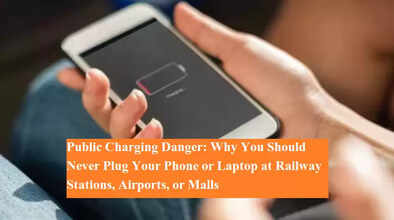Public Charging Danger: Why You Should Never Plug Your Phone or Laptop at Railway Stations, Airports, or Malls

In today’s digital age, smartphones, laptops, and tablets have become an essential part of our lives. Whether we are traveling or spending time at cafes, the need to charge our gadgets arises frequently. Many people, without giving it a second thought, plug their devices into free charging ports available at railway stations, airports, shopping malls, or bus terminals. However, cybersecurity experts warn that this habit could put your personal data and financial security at serious risk.
How Public Charging Can Lead to Hacking
At first glance, public charging cables look no different from the ones you use at home. Your device charges normally, which is why most people don’t suspect anything unusual. But security researchers explain that these cables are often “OMG cables”, specially designed with hidden microchips that allow hackers to steal your information silently.
As soon as you connect your device, these chips can transfer data to cybercriminals without triggering any alerts. Unlike public Wi-Fi hacking, where users are often warned, this method works in the background, making it even more dangerous.
What Data Can Be Stolen?
According to popular tech YouTuber Rajiv Makhni, plugging your device into these malicious cables gives hackers full access to your system. Within minutes, they can remotely capture sensitive details, including:
-
Online banking credentials
-
Credit and debit card information
-
Email and social media login IDs
-
Personal photos and videos
-
One-time passwords (OTPs)
-
Saved notes and confidential files
The scariest part is that your device continues to charge normally, so you may never realize that you have been hacked. A hidden Wi-Fi signal is created during the connection, enabling hackers to control your device from anywhere in the world.
Why Public Charging Cables Are Riskier Than You Think
Many travelers assume that using a charging cable provided by authorities at airports or malls is safe. But cybersecurity experts caution that these public setups are the easiest targets for hackers. Malicious cables are designed to look authentic, making it nearly impossible for the common user to differentiate between a safe and a compromised one.
Even a single instance of plugging into such a cable can expose your private information. Considering how much sensitive data we store on our devices today, the damage can be both financial and personal.
How to Protect Yourself
The good news is that with some precautions, you can avoid falling victim to these cyber traps. Experts recommend the following safety measures:
-
Never use public charging cables provided at airports, railway stations, bus stops, or cafes.
-
Always carry your own charging cable and adapter to avoid using unknown devices.
-
If you must use a public port, use a USB data blocker (USB condom) – a small device that blocks data transfer while allowing charging.
-
Avoid borrowing charging cables from strangers, as even those could be compromised.
-
Prefer power banks when traveling, as they provide a safer alternative for emergency charging.
The Bottom Line
Public charging stations may seem like a convenience, but they could turn into a nightmare if misused by hackers. With cyberattacks becoming more advanced every year, it is important to stay alert and cautious. Something as small as plugging your phone into a public cable can lead to major financial losses and privacy breaches.
So, the next time you are at an airport, railway station, or shopping mall, remember: a few minutes of convenience is not worth risking your personal data. Carry your own charger, keep a power bank handy, and protect yourself from this silent but dangerous cyber threat.

